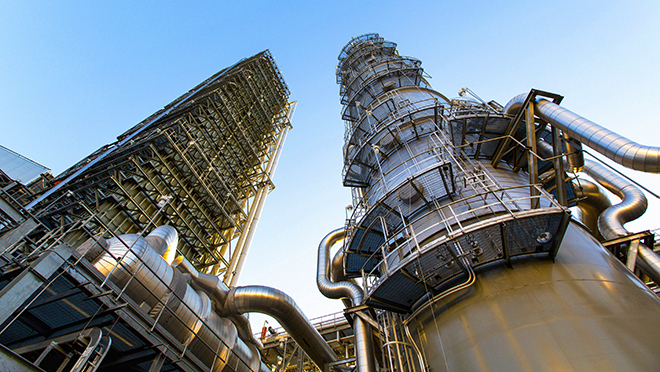Featured Topics
Featured Products
Events
S&P Global Offerings
Featured Topics
Featured Products
Events
S&P Global Offerings
Featured Topics
Featured Products
Events
S&P Global Offerings
Featured Topics
Featured Products
Events
Financial and Market intelligence
Fundamental & Alternative Datasets
Government & Defense
Professional Services
Banking & Capital Markets
Economy & Finance
Energy Transition & Sustainability
Technology & Innovation
Podcasts & Newsletters
Financial and Market intelligence
Fundamental & Alternative Datasets
Government & Defense
Professional Services
Banking & Capital Markets
Economy & Finance
Energy Transition & Sustainability
Technology & Innovation
Podcasts & Newsletters
13 Oct, 2021
By Karin Rives

| The U.S. has had no power plants operating with carbon capture technology ever since NRG Energy suspended operations at its Petra Nova power plant in 2020. Source: NRG Energy |
The U.S. has seen lawmakers from both parties agree that carbon capture is one important way to rein in greenhouse gas emissions and rural communities are rallying around plans to retrofit large American coal power plants with the technology to save jobs.
But one of the most high-profile carbon capture projects in the U.S., the $1 billion Project Tundra in North Dakota, is facing months of delays after its engineering contractor apparently pulled out in March. The Minnkota Power Cooperative Inc., which is spearheading the project at its 692-MW Milton R. Young coal-fired power plant, has acknowledged it is also having difficulty securing private-sector funding
"It's not clear why investors would sink a billion dollars into any risky and controversial coal carbon capture proposal, much less one facing such major outstanding questions," said Joe Smyth, a research manager with the Energy and Policy Institute. The watchdog group obtained copies of reports the electric co-op filed with the U.S. Energy Department detailing Project Tundra's struggles.
Minnkota received a $9.8 million grant from the DOE in 2019 for the front-end engineering work that has now been delayed by a year. The co-op said in its latest quarterly progress report to the DOE that it is talking with other potential construction contractors but that the process "is progressing slower than anticipated."
Minnkota's former contractor Fluor Corp. could continue to work on Project Tundra in a more limited capacity and bring in additional partners, noted John Thompson, a technology and markets director for the Clean Air Task Force who monitors U.S. carbon capture projects. He said Fluor likely did not walk away from the contractor job over concerns with the technology but rather due to its corporatewide push away from fixed price to reimbursable contracts.
"They're shifting their portfolio and have been pretty candid about that," Thompson said. "They're restructuring all their stuff to be less reliable on fixed contracts."
Neither Minnkota Power nor Fluor responded to requests for comment.
Financing concerns
In all, Project Tundra received $43 million in initial DOE grants under former President Donald Trump. The electric co-op said earlier this year it is seeking a $700 million DOE loan guarantee and expects to tap into a new $250 million state loan program designed specifically for Project Tundra that was signed into law in May.
Private-sector support has been harder to secure, however. Stacey Dahl, a senior manager of external affairs for Minnkota, described the project's finance challenges at an event Sen. Kevin Cramer, R-N.D., held with The Goldman Sachs Group Inc. CEO David Solomon in Bismarck on Sept. 9.
"We paired with a multi-national bank that had a real interest in this project," Dahl told Solomon. "And it wasn't long into that relationship that the parent company made the decision that [it would make] no more investment in coal. No more relationships with coal…even if it's supposed to have a technological solution."
Goldman Sachs Environmental Policy Framework prohibits the investment firm from financing new coal-fired generation anywhere in the world unless it is outfitted with carbon capture and storage or some other technology that eliminates all or most climate-warming emissions. Solomon offered to put Dahl in touch with someone at his company but cautioned that new financing opportunities could be hard to come by.
"The reality that I think we all have to accept is that the institutional capital world is done with coal," Solomon said. " I just don't think [it] is going backward on this."
Investors in Project Tundra could reap $50 in tax credits for each ton of carbon that is captured and sequestered underground near the plant, a figure that could be higher in the future if Congress boosts the credit. But other factors also must be considered.
"Fortunately, and unfortunately maybe, we're seeing some private investment firms not wanting to invest in coal projects even with these tax credits, just on their ESG goals and objectives," Shannon Angielski, a principal with the law firm Van Ness Feldman, told the Energy Bar Association's Mid Year Energy Forum on Oct. 12.
At the Bismarck event, Sen. Cramer questioned why anybody would have an issue with carbon capture at a coal plant.
"Who wouldn't love a type of technology that captures carbon and utilizes it in a way that extends the life of a coal-fired power plant, extends the life of a coal mine, and extends the life of an oilfield," Cramer asked. "I mean, who doesn't love that, [when done] in a very sustainable and clean way."